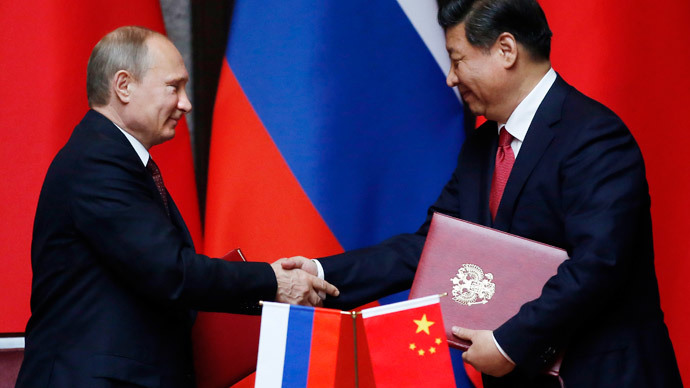'West may end up isolated if Russia turns East'

Russia is about to hitch its wagon to the fastest growing economy and largest market in the world, Business New Europe editor Ben Aris told RT, adding that the West will ultimately be playing catch-up after its efforts to isolate Russia with sanctions.
RT:So, Ben, these stronger ties between Moscow, many expect them obviously to be beneficial for both sides. But where does that leave Russia’s significant trade partner, the EU?
Ben Aris: Well, it’s going to be part of Russia’s turn towards the East, reorientation if you like, as a function of the worsening relationships with Western Europe. I think to begin with, it won’t make that much difference in so much as Russia is a commodity provider, oil and gas being the main commodities, and Russia is tied to Europe through its gas pipelines, so that will continue.
What we’re talking about is where Russia’s going to go in the future and I think all of the intention, all of the energy is going to be thrown into building up Russia’s trade and energy exports to the East and those that existed in the West are going to sort of remain and not develop any further.
This could play against Europe in the long run; if all the growth is coming out of Asia and China and the BRICS countries, then it could be that the EU sort of gets left behind while Russia enjoys the ride on the wave of those growing economies.
RT:Putting economics aside, what about politically? What could this partnership do in terms of international affairs?
BA: I think we’re seeing - or about to see, assuming that these deals go well tomorrow - a massive change in the set-up, the balance, the geopolitical balance. In so much as the West has been confronting Russia over the Ukraine problem. But Putin said from the beginning that his goal in foreign policy is to create a multipolar world. Now he’s been kind of on his own doing that, as opposed to the unipolar world which is dominated by America. But Russia and China have never been natural friends. However, China has come out very strongly in support of Russia as they’ve showed down with the States.
And I think that’s because Chia is as worried about this unipolar set up as Russia is. So the irony is this whole fracas has been to push Russia and China together and to get them to get over their natural mistrust of each other and to become deep and strategic partners. So this is a new political alliance we’re seeing, a new political configuration. It’s got enormous consequences going forward.

RT:Should Washington be concerned by all of this?
BA: Well, the irony of these sanctions is that they’ve been attempting to isolate Russia and make it a pariah. But one of the upshots of this, if this new relationship does work out, is that it could end up being the West that’s isolated, insomuch as they get to miss out on this sort of boom that’s going on in the emerging world. It’s been widely reported that China is about to overtake the states in terms of the size of its economy, and Russia’s about to hitch its wagon to the fastest growing and largest market in the world. So strategically you’ve got to wonder, what’s that going to mean for the West, who are going to end up playing catch-up?
RT:But surely Russia isn’t the only country - we’ve seen the likes of the UK, of course, doing massive trade deals with China. Do you think there would in effect be a race to do business with China - and Russia clearly isn’t the only country that’s going to be taking part in this?
BA: No indeed. But Russia and China have been described as the best synergy on the planet. China has the people, the massive consumer market, it’s got the cash. Whereas Russia has all the raw materials and that’s what China is missing. That’s what Russia offers China, and China doesn’t function without those inputs to its factories. What the Western countries are offering are high technology and finished goods. But Russia has the raw materials to make the Chinese economy work, without which it won’t be able to function and compete.
RT:So there have been concerns about China’s economy, haven’t there? Do you think perhaps countries could become too resilient on China at this stage?
BA: Well, its big, and I think the problem is, is that it remains an emerging market; it’s not a democracy, it’s not a free market in the sense that we have in Europe, and the history has been that emerging markets have crises and China hasn’t had one yet. So I think at some point, China is going to have a crisis. And when it does, the whole world is going to be affected. It’s going to be very nasty. Worryingly, the banks are overextended; worryingly, the property market has started to turn down in China. And they’ve got to manage this. Happily, they have this enormous cash cushion, so hopefully they can always engineer a soft landing. But it’s certainly going forward. This is going to be an increasing concern to everyone - how do you insulate yourself from China if it does crash and everyone’s rushing to expose themselves as much as they can at this point?
The statements, views and opinions expressed in this column are solely those of the author and do not necessarily represent those of RT.
The statements, views and opinions expressed in this column are solely those of the author and do not necessarily represent those of RT.












